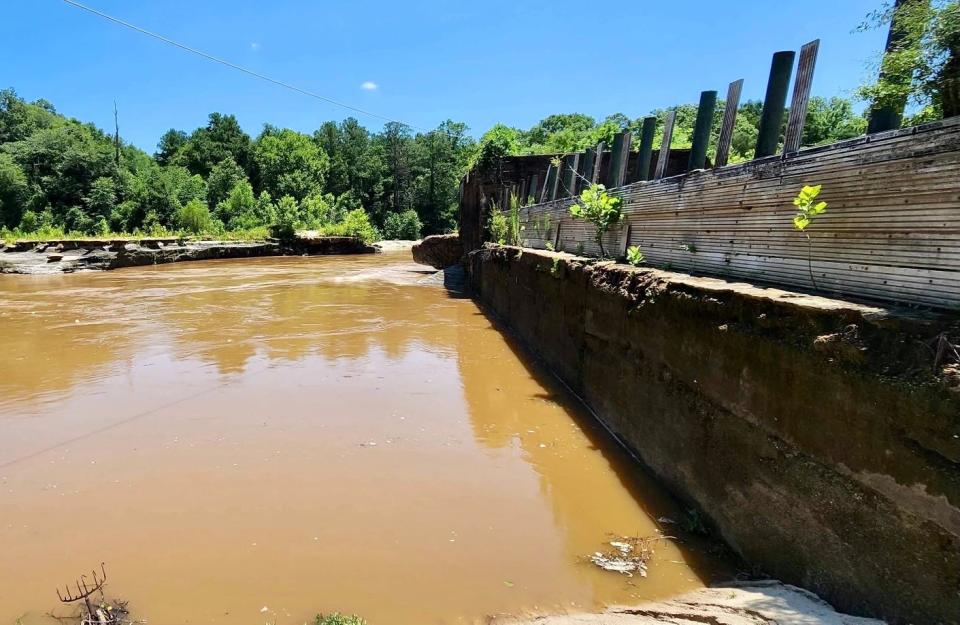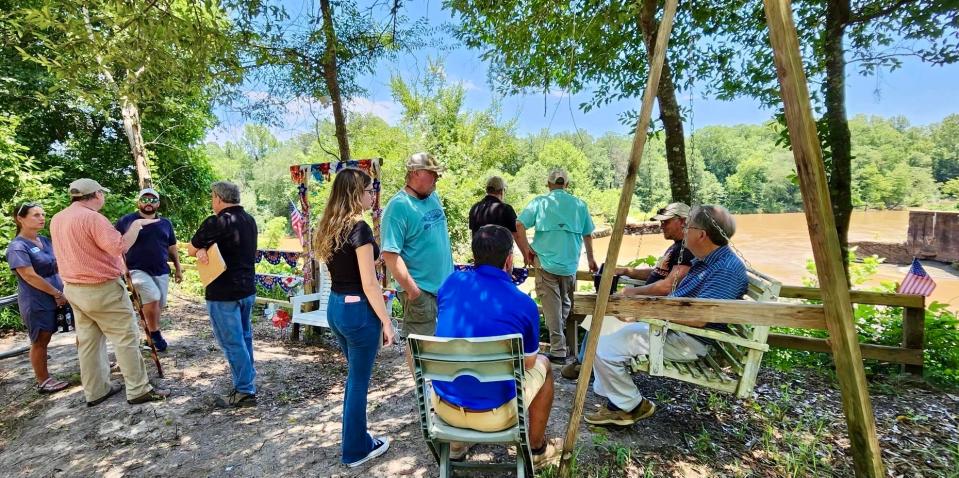Removal of Elba dam could launch eco-tourism opportunities in Alabama
ELBA, Alabama — The Pea River holds a vital place in Elba’s history and will continue to shape its future.
The collaborative efforts of The Nature Conservancy, the National Parks Service, the U.S. Fish and Wildlife Service, the Alabama Scenic River Trails, Restoration154, the city of Elba, and individual stakeholders promise to bring a new chapter to town when the removal of an historic hydroelectric dam transforms the area into an eco-tourism hotspot.
The Elba Hydroelectric Power Dam played a crucial role in the rural electrification efforts of central and south Alabama. At the time of its operation, access to electricity was limited in many rural areas, and the dam supplied power to the communities of Troy, Dothan, and other surrounding areas.
After a 2015 flood in Elba, the dam was breached, putting it out of operation. The cost of rebuilding was prohibitive, so the owners had the license revoked and are in the process of transferring ownership to The Nature Conservancy.

More: Montgomery Advertiser partners with Auburn University program to share more rural stories
The Nature Conservancy is a global nonprofit working to conserve the lands and waters on which all life depends. One of their goals is to remove most of the foreign materials in the waterways to allow the Gulf sturgeon to reach their native spawning grounds.
Since the construction of the dam, their spawning sanctuaries have been inaccessible. “At the Cahaba River Marble Slab, we were seeing fish literally bumping into it with their noses,” said Steve Northcutt, director of protection for the Nature Conservancy, suggesting the same repercussions are happening at the Elba dam site.
“The dam is basically a barrier in their passage to breeding grounds,” Northcutt said. The dam restoration efforts are expected to eliminate this hindrance, providing a clear path for the Gulf sturgeon and other fish species.
The Nature Conservancy’s main goal is to “remove the failed hydroelectric dam to in turn restore a natural flow of the river and allow fish passage, mostly for Gulf sturgeon,” Northcutt explained.
From start to completion, Northcutt said, the Nature Conservancy will coordinate all steps, including getting funding for the project.
Meanwhile, Gov. Kay Ivey has spearheaded efforts to create a new “Innovate Alabama” initiative that “seeks to promote, expand, and protect Alabama’s outdoor recreational assets for the enjoyment of current and future Alabamians,” according to the Council on Outdoor Recreation. Those involved with the efforts in Elba hope that this will help with funding and awareness for the project in the future.
The plan at the dam site also involves the National Parks Service. Bill Lane, landscape architect and project manager for the Rivers, Trails, and Conservation Assistance Program of the National Parks Service, explained the plans to make the Pea River an eco-tourism destination through the creation of a Blueways trial. Restoration154, a local nonprofit, applied for and received a planning grant in 2022 that is still ongoing.
“A Blueways trail is basically a recreation trail through the water, down a river corridor. This would spur even more new development,” Lane explained.
“Regional trails like these draw people from all over the world,” Lane said, adding that it could make Elba a new hot spot for river recreation while raising awareness about the river and showcasing it as a valuable amenity for the community.
The Pea River’s natural rock outcrops and waterfalls make it an ideal candidate. “It’s a very scenic river. There’s not a whole lot of development so you’re in nature the whole time,” he said.

The idea is to create a low-impact design that would not disrupt any of the natural scenic opportunities found along the river. Interpretive signage will allow river goers to learn about significant fauna and flora along the river as well as the historical importance of the dam site. The Blueways trail will be ADA accessible allowing people with disabilities to enjoy being out on the water.
According to Restoration154’s Laurie Chapman, the many parties involved, including landowners of adjacent parcels, will need to come together to bring all the plans to fruition. “It’s going to be a long process, but it appears that things are moving in the right direction to make this happen,” Chapman said.
Built between 1911 and 1913, the Elba Hydroelectric Dam is recognized as the oldest example of reinforced concrete hydroelectric dam construction in Alabama. Its completion in 1913 marked a significant milestone in the development of hydroelectric power in the region.
With a generating capacity of 3,000 horsepower, this power capacity was substantial for the time. In today’s terms, the dam would’ve generated enough electricity to power 1,000 homes with a maximum capacity of 1,500. The power generated by the dam was used for sawmills, hospitals, fire stations, police stations, and other essential industries.

The dam’s operations helped bring the benefits of electric power to rural areas, contributing to the overall progress and modernization of central and south Alabama.
Despite the challenges brought by past floods, the community has demonstrated remarkable resilience and determination to rebuild time and time again.
Wayne Lawford, the owner of Lawford’s Hardware, appreciates the benefits the river brings, stating, “Elba has benefits that most towns don’t have, and one is having the river running right through it.”
Even during the 1998 floods, local businesses like Lawford’s Hardware continued to provide support to the community. Lawford recalled, “We never slowed down in the 98’ flood because everyone was needing stuff, so I just did what I could with what I had to help everyone out.”
Recognizing the town’s potential, Lawford highlighted the positive developments, such as the river project. His wife, Betty Lawford, emphasized the resilience of the community, stating, “This little town has been through it, but they’ve fought back every time.”
Mikailie Caulder, a Living Democracy student at Auburn University, is living and learning this summer in Elba, Alabama, as a Jean O'Connor Snyder Intern with the David Mathews Center for Civic Life. The nonprofit program, coordinated by the Caroline Marshall Draughon Center for the Arts and Humanities in the College of Liberal Arts, prepares undergraduate college students for civic life through living-learning experiences in the summer.
This article originally appeared on Montgomery Advertiser: Removal of Elba dam could launch eco-tourism opportunities in Alabama

